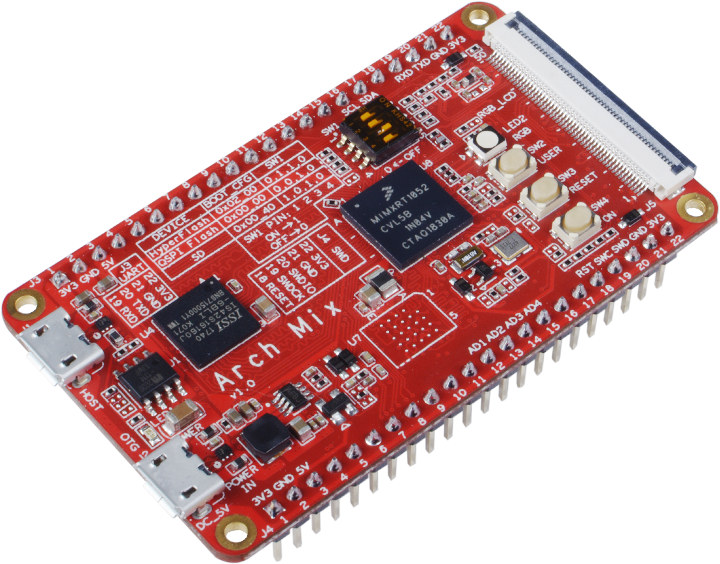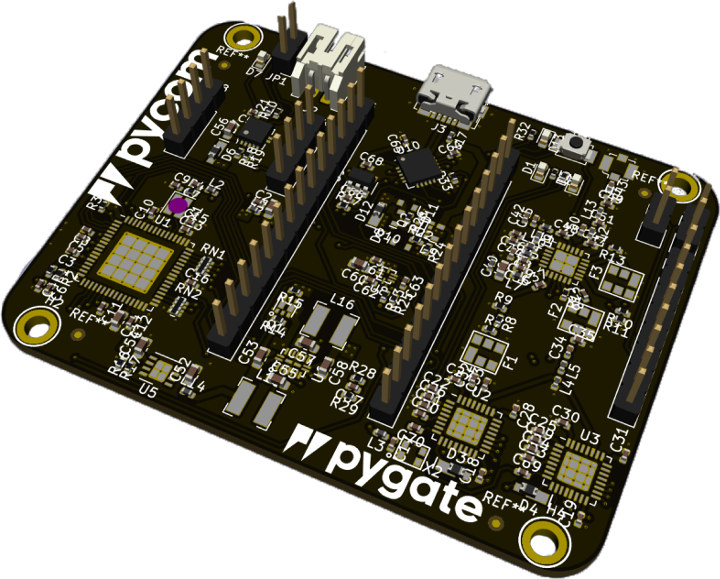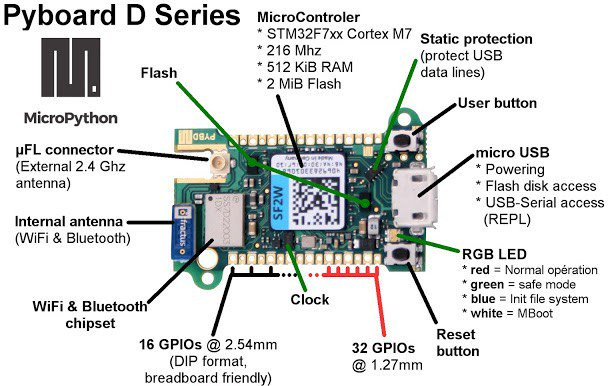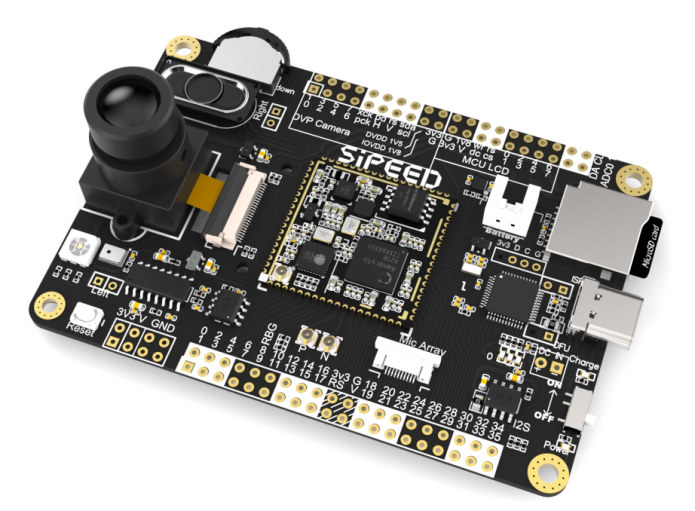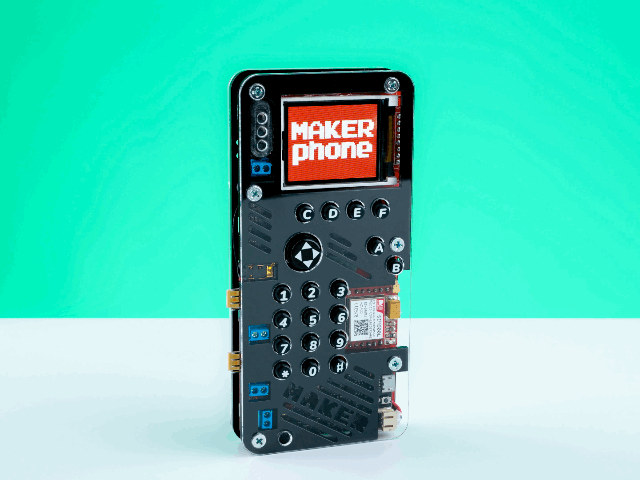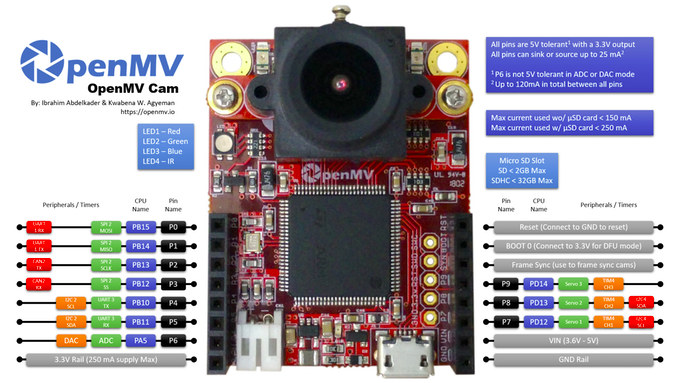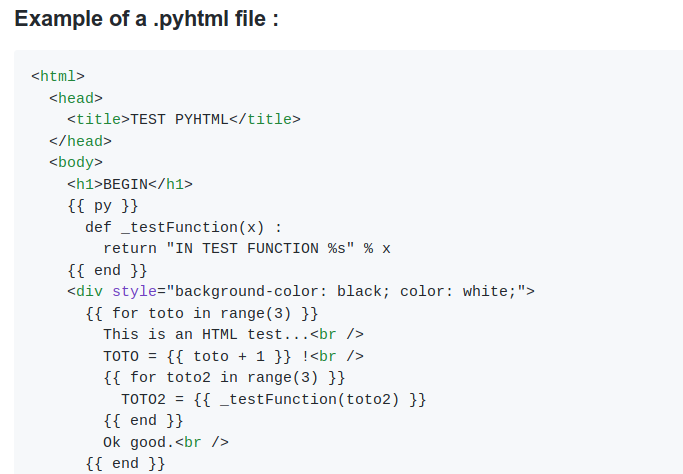NXP i.MX RT Arm Cortex-M7 crossover processors are supposed to fill the gap between microcontrollers and more powerful application processors thanks to real-time capabilities, and a higher CPU frequency. We’ve already covered several i.MX RT1050 series platforms including NXP’s own evaluation board and Forlinx OK1052-C development kit comprised of a carrier board and an i.MX RT1052 system-on-module. But if you’d like to experiment with NXP i.MX RT processor using a cheaper, smaller, and easier to purchase development platform, Seeed Studio has started to sell Arch Mix development board for $29.90 plus shipping. Arch Mix board specifications: SoC – NXP i.MX RT1052 Arm Cortex-M7 processor @ up to 528MHz System Memory – 32MB SDRAM Storage – Optional 64MB Hyperflash, 8MB QSPI flash, microSD card socket Display I/F – RGB LCD interface USB – 1x micro USB 2.0 host port, 1x USB OTG port for data and power Expansion Headers – 2x […]
Pycom Pygate is a 50 Euros 8-channel LoRa Gateway Board
Semtech SX1308 digital baseband Chip for indoor LoRaWAN pico gateways was announced a few years ago, but it took a while before multi-channel gateways integrated the new low cost chip, and 2019 appears to be the year where pico LoRa gateway will be launched. We covered the $69 The Things Indoor Gateway a few weeks ago, but there will be soon another option, although geared towards developers, with Pycom Pygate low-cost 8-channel gateway board that connects to LoRa or the company’s Pymesh network. Pycom Pygate gateway board preliminary features and specifications: Dual SX1257 transceivers for a total of 8 channels support Frequencies – 863-870 MHz and 902-928 MHz Baseband processor: Semtech SX1308 Ultra-low power standby mode Ethernet with PoE via the optional daughter board Powered via USB, LiPo Battery and Ethernet via the optional daughter board LiPo battery charging via the USB port USB to serial connection for the Pycom […]
Pyboard D Series MicroPython Board Features STM32F7 MCU, WiFi and Bluetooth
Micropython is a lightweight implementation of Python for microcontroller which we covered first in 2013. The port is supported by various hardware platforms, and I even tested Micropython on ESP32 a little while ago, but the developer – Damien George – also launched officially supported boards starting with Pyboard in 2014 with an STM32F4 microcontroller. At FOSDEM 2019, the upcoming Pyboard D-series (aka Pyboard D, or just PyBD) board was introduced during the Micropython presentation with a faster STM32F7 Cortex-M7 MCU, as well as built-in WiFi and Bluetooth connectivity. Pyboard D preliminary specifications: MCU – STMicro STM32F7xx Arm Cortex M7 microcontroller at 216 MHz with 512KB RAM, 2MB flash Storage – micro SD card slot, and 2x external flash chips Connectivity – WiFi & Bluetooth with on-board antenna and u.FL antenna connector USB – 1x micro USB port for power, flash disk access, and USB to serial debugging/programming Expansion 2.54mm […]
PyGo Wearable Devices Create LoRa Mesh Networks (Crowdfunding)
Pycom has made some interesting IoT boards running MicroPython in the past starting with WiFi capable WiPy in 2015, and followed by various others supporting various wireless standard including Bluetooth, LoRa, Sigfox, and NB-IoT with LoPy and Fipy. The company launched all their boards via crowdfunding campaigns, and they are now back on Kickstarter for their PyGo plug-n-play wearable devices creating PyMesh networks with up to 12km range between nodes, and managed using Pylife mobile app. Typical use cases include basic connectivity (e.g. messaging) in remote areas without cellular access, and assets / pets / kids location tracking, There are two version of PyGo: PyGo1 with mesh networking only, and PyGo2 that adds cellular network access. Pygo hardware specifications: SoC – Espressif Systems ESP32 dual core WiFi 4 + BLE SoC System Memory – 64 Mbit (8MB) RAM Storage – 8MB flash Display – 128×36 OLED display Connectivity PyMesh up […]
MAIX Development Boards with Sipeed M1 RISC-V AI Module Launched for $5 and Up (Crowdfunding)
Sipeed M1 (aka MAIX-I)is a compact module based on Kendryte K210 dual core RISC-V processor designed for low power artificial intelligence workloads at the edge, such as face detection, object recognition, or audio processing. The module and some development boards are available on Taobao for the Chinese market, as well as YOYCart for the rest of the world, but the company has now launched several MAIX boards based on M1 module through an Indiegogo campaign with price starting at just $5 a piece. Sipeed MAIX Bit (aka MAIX Micro) is the cheapest one at $5 (early bird) / $6 with the following specifications: SoC – Kendryte K210 dual core 64-bit RISC-V processor @ 400 MHz (overclockable up to 800 MHz) with KPU CNN hardware accelerator APU audio hardware accelerator with support for up to 8 mics, up to 192 KHz sample rate FPIOA (Field Programmable IO Array) mapping 255 functions to […]
$94 MAKERphone DIY Mobile Phone Supports MicroPython, Arduino IDE, and Scratch (Crowdfunding)
If you ever wanted to buy a mobile phone that you can assemble yourself, RePhone Kit Ctreate going for $59 is a nice option, but in truth it does not exactly look like your typical phone with its almost square shape. It’s also good to have more option, that’s exactly what MAKERphone is offering with a DIY mobile phone targeting the educational market. Beside the educational value of the assembly also involving some soldering skills depending on the selected kit, kids will be able to learn to program the phone with MicroPython, the Arduino IDE (C language), and/or Scratch visual programming. MAKERphone kit content and specifications: MAKERphone circuit board with 8x user LEDs for backlight (and special effects), 4-way mechanical joystick, 12-button numeric keypad, A, B, C, D, E, and F buttons, DS3231 RTC chip, vibrator… Main microcomputer module based on Espressif Systems ESP32 WiSoC with 802.11 b/g/n WiFi, Bluetooth […]
OpenMV Cam H7 MicroPython Machine Vision Camera Launched on Kickstarter
OpenMV team has launched an upgrade to their popular OpenMV CAM M7 machine vision camera, with OpenMV CAM H7 replacing the STMicro STM32F7 micro-controller by a more powerful STM32H7 MCU clocked at up to 400 MHz. Beside having twice the processing power, the new camera board also features removable camera modules for thermal vision and global shutter support. OpenMV CAM H7 camera board specifications: MCU – STMicro STM32H743VI Arm Cortex M7 microcontroller @ up to 400 MHz with 1MB RAM, 2MB flash. External Storage – micro SD card socket supporting up to 100 Mbps read/write to record videos and store machine vision assets. Camera modules Omnivision OV7725 image sensor (default) capable of taking 640×480 8-bit Grayscale / 16-bit RGB565 images at 60 FPS when the resolution is above 320×240 and 120 FPS when it is below; 2.8mm lens on a standard M12 lens mount Optional Global Shutter camera module to capture […]
MicroWebSrv Lightweight HTTP Web Server Supports HTML/Python Language Templating
There are many languages that can be used to create a web page: HTML, HTML5, JavaScript, PHP, etc… But Python? Apparently yes, as MicroWebSrv lightweight web server – mostly designed for ESP32 platforms running MicroPython such as Pycom boards – supports inserting Python code inside “HTML” files with the extension .pyhtml. The code can be found in Github, and is only comprised of three files. microWebSrv.py – The Web server microWebSocket.py – The optional support of WebSockets microWebTemplate.py – The optional templating language for .pyhtml rendered pages Beside HTML/Python files, the web server can handle GET, POST, … requests, an embedded full REST API, routing handlers, WebSockets, etc… That’s what a mixed HTML + Python .pyhtml file may look like:
|
1 2 3 4 5 6 7 8 9 10 11 12 13 14 15 16 17 18 19 20 21 22 23 24 25 26 27 28 29 30 31 32 33 |
<html> <head> <title>TEST PYHTML</title> </head> <body> <h1>BEGIN</h1> {{ py }} def _testFunction(x) : return "IN TEST FUNCTION %s" % x {{ end }} <div style="background-color: black; color: white;"> {{ for toto in range(3) }} This is an HTML test...<br /> TOTO = {{ toto + 1 }} !<br /> {{ for toto2 in range(3) }} TOTO2 = {{ _testFunction(toto2) }} {{ end }} Ok good.<br /> {{ end }} </div> {{ _testFunction(100) }}<br /> <br /> {{ if 2+5 < 3 }} IN IF (1) {{ elif 10+15 != 25 }} IN ELIF (2) {{ elif 10+15 == 25 }} IN ELIF (3) {{ else }} IN ELSE (4) {{ end }} </body> </html> |
You can use double curly braces {{ and }} to insert MicroPython code, if statements, for loops, or includes. I’m not sure if this makes really sense for all […]


